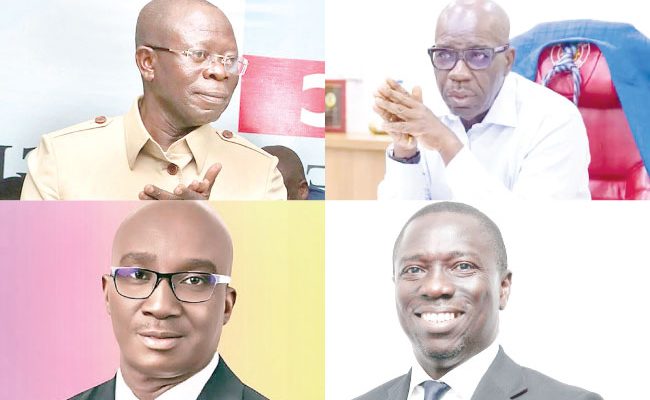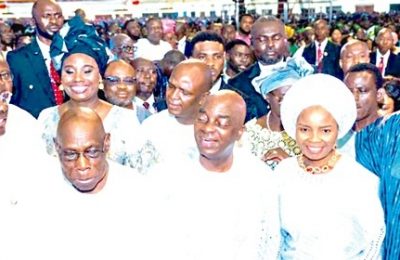Abuja Bureau Chief, LEON USIGBE, analyses the dynamics surrounding the Edo State gubernatorial election, the interplay between the People’s Democratic Party (PDP) and the All Progressives Congress (APC), and how Governor Godwin Obaseki’s political manoeuvres that alienated key stakeholders within his party backfired, allowing the relatively unknown Monday Okpebholo to gain unexpected traction in the Edo Central zone.
The political dynamics in Edo State have been tumultuous over the past year, with Governor Godwin Obaseki at the centre of a web of intrigues that have reshaped the landscape. Obaseki’s decisions, particularly in the 2023 Peoples Democratic Party (PDP) National Assembly primaries, are widely seen as pivotal to the rise of Monday Okpebholo, now his political adversary and the newly elected governor of Edo State. In many ways, analysts argue, Obaseki’s actions created the very challenge that now threatens his political legacy.
Obaseki’s role in orchestrating the outcome of the PDP primaries was controversial. Mike Onolememen, a former works minister and a formidable candidate, had emerged as the party’s senatorial candidate for Edo Central. However, Obaseki intervened, working in tandem with the national secretariat of the PDP to overturn the result, thereby denying Onolememen the ticket. His rationale? Obaseki was determined to have Senator Clifford Ordia return for a third term, despite a locally agreed-upon tradition of a maximum of two terms for elected representatives from the zone. This move backfired spectacularly. The people of Edo Central, long regarded as a PDP stronghold, rejected Obaseki’s candidate and threw their support behind Okpebholo, a virtually unknown figure from the All Progressives Congress (APC), in what was seen as a protest vote against Obaseki’s imposition.

The consequences of these actions have been profound for the PDP in Edo. Since the 2023 election, the party has been mired in crisis after crisis, suggesting a decline in its influence within the state, even though it technically remains the ruling party. Much of this unrest stems from Obaseki’s mismanagement of the internal divisions within the party. The PDP in Edo is divided between the so-called “Legacy PDP,” longstanding members of the party, and those who defected from the APC with Obaseki during his acrimonious battle to secure a second-term ticket after falling out with the APC leadership. The governor’s inability to bridge this divide led to alienation, with many of the PDP’s key figures becoming increasingly frustrated. This dissatisfaction eventually led to high-profile defections to the APC, the most notable being that of Obaseki’s former deputy, Philip Shaibu, who was controversially impeached before rejoining the APC.
While Obaseki made commendable strides in human capital development and initiated major projects such as a power plant, refinery, and seaport, these efforts were insufficient to convince the electorate. Many citizens remained unimpressed by the lack of infrastructural improvements in everyday sectors such as roads, healthcare, and water provision. The Obaseki administration’s inability to address these basic concerns further alienated the populace, creating fertile ground for the APC to make significant inroads.
As more PDP stalwarts defected to the APC, the opposition party became emboldened, ready to mount a serious challenge in the 2024 gubernatorial election. Although Okpebholo was widely regarded as a weak candidate, lacking the educational background and political sophistication that Edo voters have historically preferred, the APC had enough momentum to turn the tide against the PDP. Okpebholo’s flaws as a candidate, including frequent verbal missteps and his failure to subject himself to media scrutiny, were offset by the APC’s ability to capitalise on the Obaseki administration’s weaknesses.

Meanwhile, the PDP’s candidate, Dr. Asue Ighodalo, was seen as a highly capable technocrat with a formidable pedigree. Many believed he was poised to win in a state that had, for the most part, leaned heavily toward the PDP in the past. However, the perception that Ighodalo was merely a front for Obaseki to retain influence damaged his campaign. This portrayal, coupled with Okpebholo’s populist appeal, made the election less straightforward than many had anticipated.

As the election drew nearer, the PDP increasingly voiced concerns about the role of federal institutions, especially the police, accusing them of arresting its members in a bid to manipulate the election in favour of the APC. These allegations fed into a broader narrative that the APC was prepared to use what is often referred to as “federal might” to capture Edo State, leveraging its control of national institutions to tip the balance in its favour.
On Election Day, the tensions reached a peak. Governor Ahmadu Fintiri, the chairman of the PDP Edo State Gubernatorial Campaign Council, accused the Independent National Electoral Commission (INEC) of conspiring with security agents to violate the Electoral Act. He claimed that the collation of results from polling units was abruptly halted to allow for alterations and substitutions, favouring the APC. Fintiri was adamant that Ighodalo had won based on the results gathered at the polling stations and wards, but that these results were manipulated during the collation process.
The conduct of the election sparked outrage, not only among PDP supporters but also within civil society organisations that had monitored the process. Many felt that the election had failed to meet basic standards of transparency and fairness. Yiaga Africa, a prominent election monitoring group, appeared to corroborate some of the PDP’s claims. According to the organisation, the results collation process had been compromised by the actions of certain biased INEC officials, working in concert with other actors to manipulate the outcome. The group’s Process and Results Verification for Transparency (PRVT) methodology revealed significant discrepancies between the official results released by INEC and its estimates.
Yiaga Africa’s findings added weight to the PDP’s allegations of electoral malpractice. The group condemned the actions of both INEC and security officials who, it said, interfered with the collation process. This interference, they argued, severely undermined the overall integrity of the election. The disparities between the official results and those observed by independent monitors were significant enough to call the entire process into question.
Despite the mounting evidence of irregularities, many political observers argue that the PDP’s troubles in Edo are largely self-inflicted. The party has struggled with internal divisions since the crisis in its Rivers State chapter, and these fractures have weakened its national organs, including the Governors Forum, the National Working Committee (NWC), and the Board of Trustees (BoT). These divisions, coupled with a lack of focus and unity, distracted the party’s leadership and hampered its preparations for the Edo governorship election. There are already fears that the same issues may affect the PDP’s chances in the upcoming Ondo State governorship election in November.
In response to the outcome of the Edo election, the PDP has signalled its intention to challenge the results in court. The party is also seeking to use this legal battle as a test of the judiciary’s independence and impartiality. In a pointed remark, the PDP national chairman, Iliya Damangun, suggested that the outcome of this case would serve as a litmus test for the judiciary’s ability to deliver justice. He warned that if the judicial system fails to uphold the law, it could undermine the very fabric of the country.
The battle over Edo State’s governorship is far from over. While Okpebholo has been declared the winner, the PDP’s determination to challenge the result in court ensures that the political drama will continue. For now, however, the APC has succeeded in capturing Edo, a state that has long been considered a PDP stronghold. Whether the PDP can recover from this setback remains to be seen, but its future success will depend largely on its ability to resolve internal conflicts and rebuild trust with its supporters. As the party prepares for future elections, including the crucial Ondo State poll, it must confront the challenges that have weakened its position and find a way to present a united front against its rivals.
In the complex landscape of Nigerian politics, the capture of Edo by the APC is both a significant victory for the ruling party and a cautionary tale for the PDP. The outcome of this election underscores the importance of internal cohesion, effective leadership, and strategic alliances in determining the fate of political parties. For the PDP, the road ahead will be difficult, but the lessons learned from Edo could prove invaluable as the party seeks to regain its footing on the national stage.








